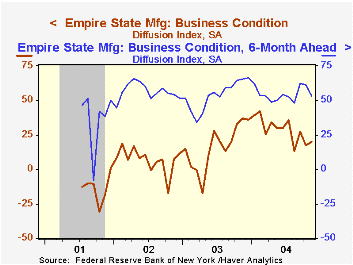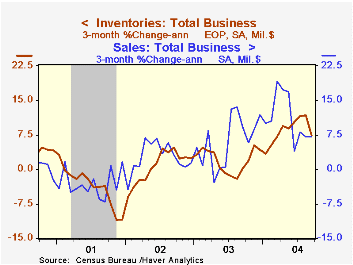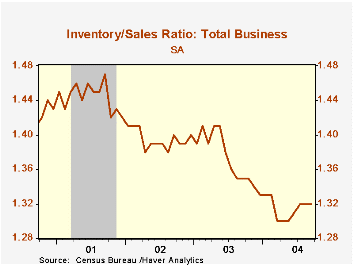 Global| Nov 15 2004
Global| Nov 15 2004Empire State Index Gain Light
by:Tom Moeller
|in:Economy in Brief
Summary
The November Empire State Index of General Business Conditions in New York's manufacturing industries recovered just 2.3 points of the 9.8 point October decline rising to 19.76, about as expected. The new orders component fell to a [...]

The November Empire State Index of General Business Conditions in New York's manufacturing industries recovered just 2.3 points of the 9.8 point October decline rising to 19.76, about as expected.
The new orders component fell to a four month low and the employment measure fell to the lowest level since March. Shipments, however, rose. Like the Philadelphia Fed Index of General Business Conditions, the Empire State Business Conditions Index reflects answers to an independent survey question; it is not a weighted combination of the components.
The prices paid index gave back nearly all of the strong 7.1 point gain in October.
Expectations for business conditions six months fell sharply to the lowest level since August.
The Empire State Manufacturing Survey is a monthly survey of manufacturers in New York State conducted by the Federal Reserve Bank of New York. Participants from across the state in a variety of industries respond to a questionnaire and report the change in a variety of indicators from the previous month. Respondents also state the likely direction of these same indicators six months ahead. April 2002 is the first report, although survey data date back to July 2001.
For more on the Empire State Manufacturing Survey, including methodologies and the latest report, click here.
| Empire State Manufacturing Survey | Nov | Oct | 11/03 | 2003 | 2002 | 2001 |
|---|---|---|---|---|---|---|
| General Business Conditions (diffusion index) | 19.76 | 17.43 | 37.01 | 16.30 | 7.02 | -13.57 |
by Tom Moeller November 15, 2004

Total business inventories edged 0.1% higher in September following strong accumulation during most of this year.
Retail inventories slipped 0.4% due to a sharp 1.3% decline in motor vehicle inventories (+12.1% y/y). Non-auto inventories advanced 0.2% though m/m declines were widespread amongst categories.
Wholesale inventories rose 0.5% (9.8% y/y). During the last ten years there has been a 63% correlation between the y/y change in wholesale inventories and the change in imports of merchandise.
Overall business sales rose 0.3% (+10.4% y/y) following strong gains during the prior two months.
The ratio of inventories-to-sales was stable at 1.32 for the third consecutive month and versus 1.37 averaged last year.
| Business Inventories | Sept | Aug | Y/Y | 2003 | 2002 | 2001 |
|---|---|---|---|---|---|---|
| Total | 0.1% | 0.7% | 7.3% | 1.9% | 1.5% | -4.5% |
| Retail | -0.4% | 0.5% | 7.2% | 4.9% | 6.0% | -2.8% |
| Retail excl. Autos | 0.2% | 0.4% | 5.5% | 3.0% | 2.6% | -1.1% |
| Wholesale | 0.5% | 1.1% | 9.8% | 2.2% | 0.4% | -4.5% |
| Manufacturing | 0.3% | 0.7% | 5.7% | -1.3% | -1.8% | -6.1% |
Tom Moeller
AuthorMore in Author Profile »Prior to joining Haver Analytics in 2000, Mr. Moeller worked as the Economist at Chancellor Capital Management from 1985 to 1999. There, he developed comprehensive economic forecasts and interpreted economic data for equity and fixed income portfolio managers. Also at Chancellor, Mr. Moeller worked as an equity analyst and was responsible for researching and rating companies in the economically sensitive automobile and housing industries for investment in Chancellor’s equity portfolio. Prior to joining Chancellor, Mr. Moeller was an Economist at Citibank from 1979 to 1984. He also analyzed pricing behavior in the metals industry for the Council on Wage and Price Stability in Washington, D.C. In 1999, Mr. Moeller received the award for most accurate forecast from the Forecasters' Club of New York. From 1990 to 1992 he was President of the New York Association for Business Economists. Mr. Moeller earned an M.B.A. in Finance from Fordham University, where he graduated in 1987. He holds a Bachelor of Arts in Economics from George Washington University.
More Economy in Brief
 Global| Feb 05 2026
Global| Feb 05 2026Charts of the Week: Balanced Policy, Resilient Data and AI Narratives
by:Andrew Cates






